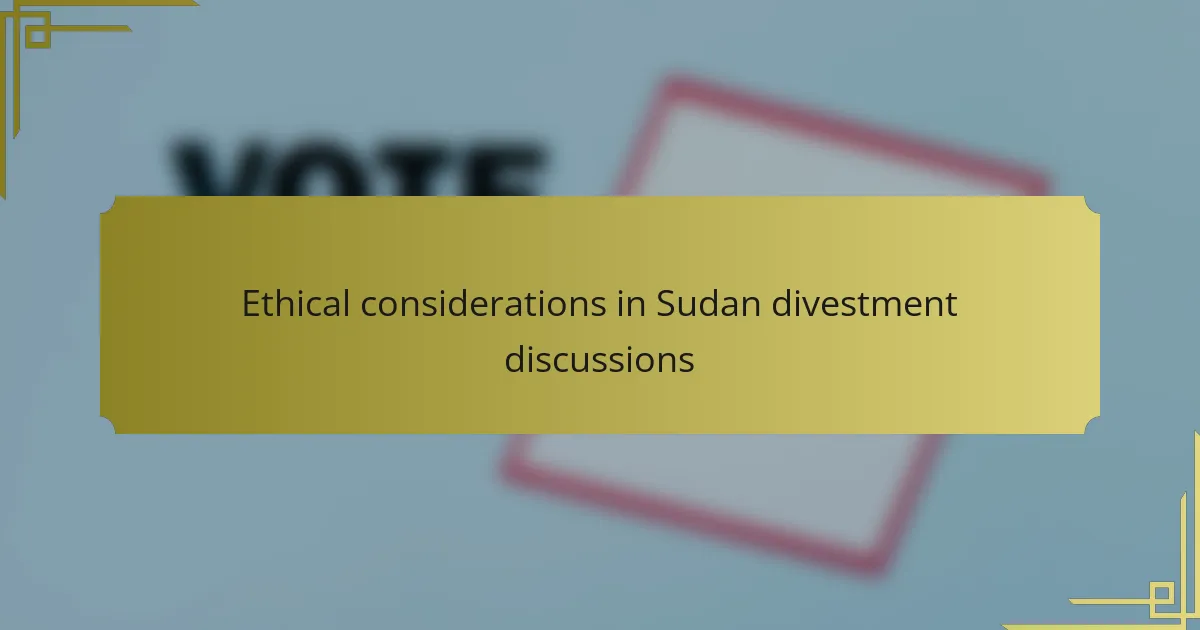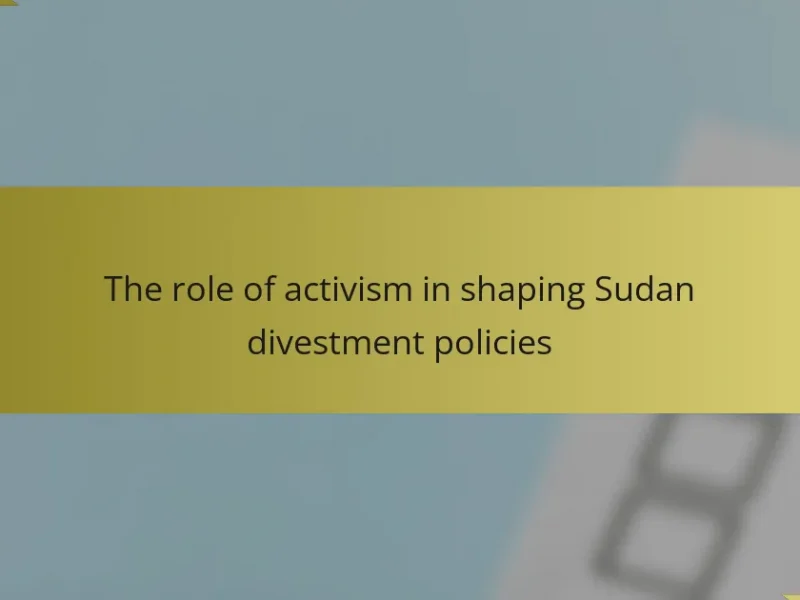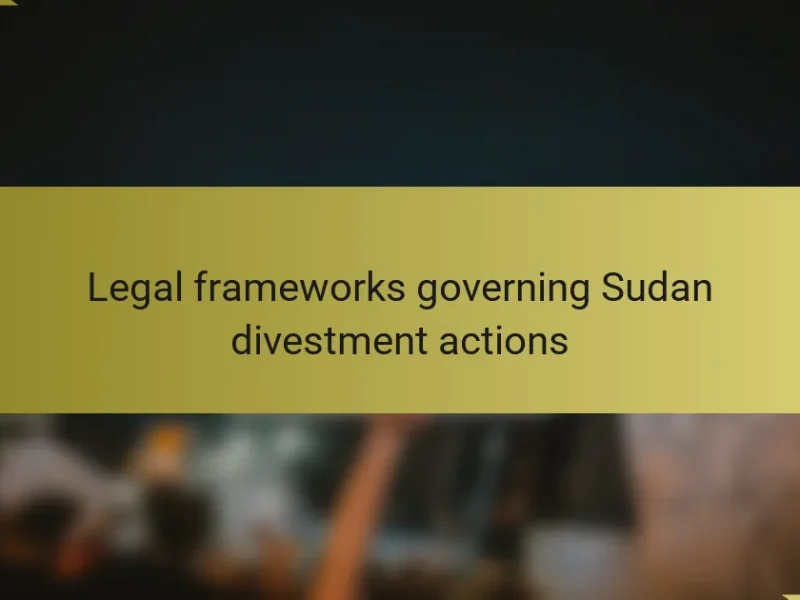The article examines ethical considerations surrounding divestment discussions in Sudan, focusing on human rights, economic impact, and corporate responsibility. It highlights human rights violations reported by organizations like Amnesty International, which raise concerns about the implications of investment in the region. The economic consequences of divestment on local populations are discussed, along with the necessity for businesses to uphold ethical standards in their investment decisions. Best practices for ethical divestment, including stakeholder engagement and adherence to international guidelines, are emphasized to foster transparency and accountability. The complexities of conflicting interests and the lack of consensus on human rights further complicate the ethical landscape in these discussions.
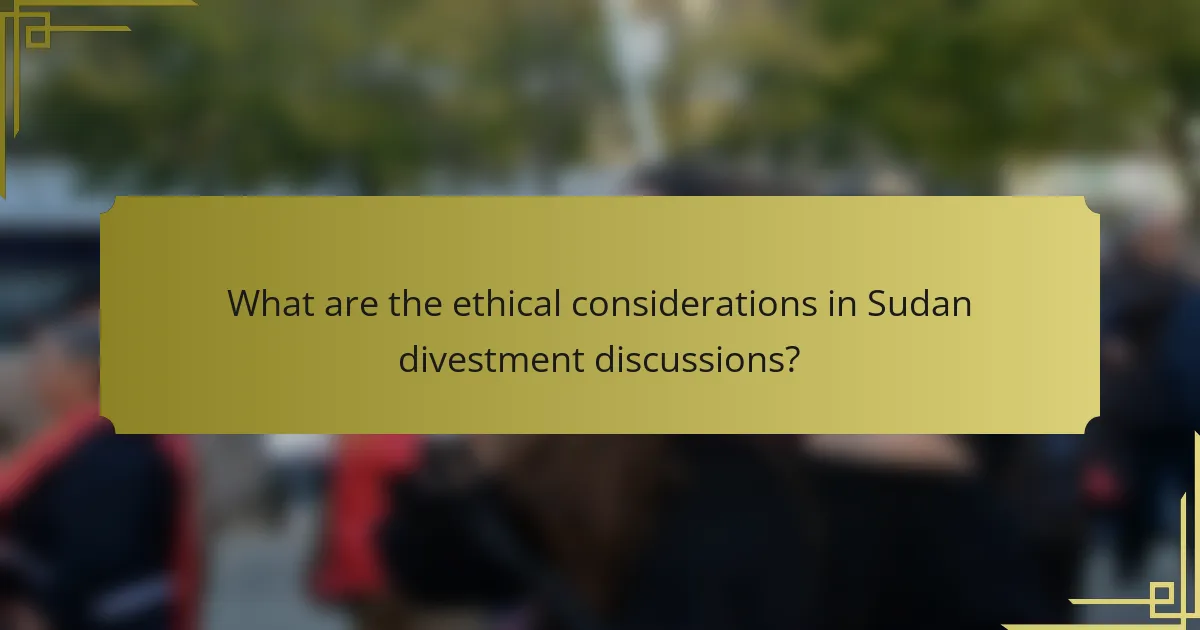
What are the ethical considerations in Sudan divestment discussions?
Ethical considerations in Sudan divestment discussions include human rights, economic impact, and corporate responsibility. Human rights violations in Sudan, such as those reported by Amnesty International, raise concerns about complicity through investment. The economic impact of divestment can affect local populations, potentially worsening their situation. Corporate responsibility demands that businesses consider the ethical implications of their investments. Transparency in decision-making processes is vital for ethical divestment discussions. Stakeholder engagement is essential to understand the community’s needs and perspectives. Balancing profit motives with ethical obligations remains a significant challenge in these discussions.
Why is divestment from Sudan a topic of ethical concern?
Divestment from Sudan is a topic of ethical concern due to the country’s history of human rights violations. The Sudanese government has been implicated in acts of genocide, particularly in Darfur, where over 300,000 people were killed and millions displaced since 2003. Companies operating in Sudan may indirectly support these human rights abuses through their financial contributions. Ethical investors seek to avoid complicity in such actions by divesting from entities linked to oppressive regimes. Additionally, divestment can serve as a form of protest against government actions, pressuring for change. The ethical implications are further highlighted by international laws and norms that condemn human rights violations, making investment in such contexts morally questionable.
What historical factors contribute to the ethical implications of divestment?
Historical factors contributing to the ethical implications of divestment include colonial legacies and economic exploitation. Colonial histories often led to systemic inequalities in resource distribution. These inequalities can create moral obligations for entities to divest from exploitative practices. For instance, divestment movements have historically emerged in response to apartheid in South Africa. The global response to apartheid highlighted ethical concerns surrounding complicity in human rights abuses. Additionally, the Sudanese civil wars have raised awareness about the ethical implications of foreign investments in conflict zones. Companies linked to the Sudanese government faced backlash for funding violence against civilians. This context underscores the importance of ethical considerations in divestment discussions. Historical precedents shape the current understanding of ethical responsibilities in investment practices.
How do human rights issues influence divestment discussions?
Human rights issues significantly influence divestment discussions by prompting ethical considerations among investors. Investors often seek to align their portfolios with their values. When human rights abuses are reported, such as those in Sudan, companies face pressure to divest. This pressure can stem from public campaigns, shareholder resolutions, or regulatory changes. For instance, divestment movements targeting companies involved in human rights violations have gained traction globally. Research indicates that investors are increasingly considering environmental, social, and governance (ESG) factors in their decisions. As a result, human rights concerns can lead to financial repercussions for companies that ignore these issues.
What are the key stakeholders involved in Sudan divestment discussions?
Key stakeholders in Sudan divestment discussions include government entities, non-governmental organizations (NGOs), and private investors. Government entities often set policies influencing divestment decisions. NGOs advocate for human rights and raise awareness about the situation in Sudan. Private investors assess the financial implications of divestment. Additionally, international organizations may provide guidance and frameworks for ethical investment practices. These stakeholders play critical roles in shaping the discourse around divestment in Sudan. Their involvement reflects a blend of ethical, political, and economic considerations.
Who are the main actors advocating for divestment?
The main actors advocating for divestment include non-governmental organizations (NGOs), activist groups, and university coalitions. NGOs like Amnesty International and Human Rights Watch play significant roles in raising awareness about ethical concerns. Activist groups, such as 350.org, focus on environmental and social justice issues tied to divestment. University coalitions often consist of student-led organizations promoting ethical investment practices. These actors collectively push for divestment from companies linked to human rights violations and environmental harm. Their advocacy is supported by research highlighting the negative impacts of investments in certain sectors.
What roles do governments and NGOs play in these discussions?
Governments and NGOs play crucial roles in the ethical considerations surrounding Sudan divestment discussions. Governments often establish policies and regulations that guide divestment efforts. They may impose sanctions or create incentives for companies to withdraw investments from Sudan. NGOs typically advocate for human rights and raise awareness about the humanitarian situation in Sudan. They provide research and reports that inform public opinion and governmental policies. For instance, organizations like Human Rights Watch publish findings that highlight the impact of divestment on local populations. This information can influence both governmental actions and corporate decisions in divestment discussions.
How do economic factors intersect with ethical considerations in divestment?
Economic factors significantly influence ethical considerations in divestment. Companies often face pressure to divest from industries linked to human rights abuses. This pressure can stem from consumer demand, investor activism, and regulatory changes. Economic incentives can drive firms to align their practices with ethical standards. For instance, divesting from unethical industries can enhance a company’s reputation. A positive reputation can lead to increased customer loyalty and market share. Conversely, remaining invested in controversial sectors may result in financial losses. Studies have shown that companies engaging in ethical divestment often outperform their peers in the long term. Therefore, the intersection of economic factors and ethical considerations creates a compelling case for divestment.
What economic impacts can divestment have on Sudan?
Divestment can lead to significant economic impacts on Sudan. It may result in reduced foreign investment, as companies withdraw their financial support. This withdrawal can lead to decreased job opportunities for Sudanese citizens. Additionally, divestment can limit access to international markets for Sudanese goods. A decline in investment may also weaken the country’s currency, causing inflation to rise. Furthermore, essential services may suffer due to reduced funding from foreign entities. Historical examples show that divestment often leads to economic isolation, which can exacerbate existing challenges. Overall, the economic consequences of divestment can be profound and multifaceted for Sudan.
How do ethical investment principles guide economic decisions regarding Sudan?
Ethical investment principles guide economic decisions regarding Sudan by promoting responsible investment practices. These principles emphasize social responsibility, environmental sustainability, and governance. Investors often avoid funding projects that contribute to human rights abuses or environmental degradation. In Sudan, issues such as conflict, poverty, and governance challenges are prevalent. Ethical investors assess risks associated with these factors before making decisions. For example, the UN has reported on human rights violations in Sudan, influencing investor sentiment. Additionally, divestment campaigns highlight the importance of ethical considerations in financial decision-making. This approach encourages companies to align their investments with ethical standards and societal values.
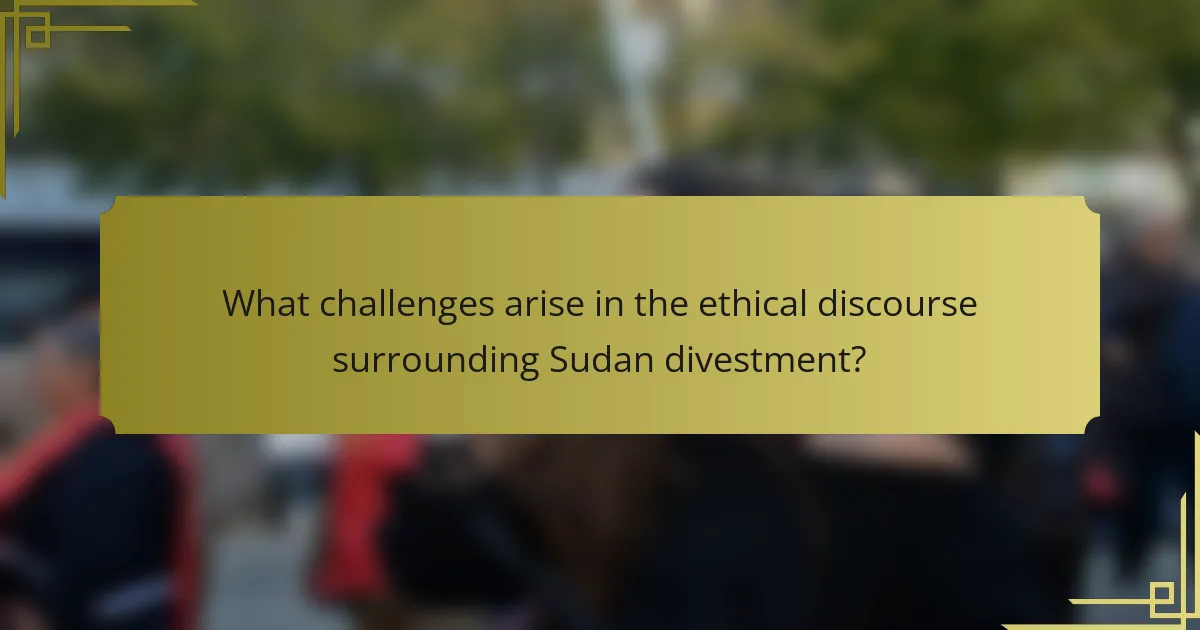
What challenges arise in the ethical discourse surrounding Sudan divestment?
Challenges in the ethical discourse surrounding Sudan divestment include conflicting interests, economic impacts, and moral implications. Stakeholders often have differing views on the effectiveness of divestment as a tool for change. Critics argue that divestment may harm the local economy and innocent civilians more than it helps. Additionally, there is debate over whether divestment genuinely pressures the Sudanese government to alter its policies. The complexities of global supply chains further complicate accountability in ethical investing. Furthermore, the lack of consensus on human rights standards creates ambiguity in decision-making. These factors contribute to a challenging ethical landscape in discussions of Sudan divestment.
What are the criticisms of divestment as an ethical strategy?
Criticisms of divestment as an ethical strategy include the perception that it does not effectively change corporate behavior. Critics argue that divesting may lead companies to become less accountable. Some believe that divestment can harm local economies and communities reliant on industries targeted for withdrawal. Additionally, there is concern that it may divert attention from more impactful forms of activism. Critics also highlight that divestment does not address underlying issues or provide solutions. Instead, it may create a false sense of progress among activists. The effectiveness of divestment in achieving ethical goals remains debated. Studies indicate mixed results regarding its impact on policy changes and corporate practices.
How do opponents of divestment argue against its effectiveness?
Opponents of divestment argue that it is ineffective in achieving change. They claim it does not significantly impact the targeted companies’ financial performance. Many assert that divestment may even harm local economies and communities. Critics argue that engagement and dialogue are more productive than withdrawal. They highlight that divestment can lead to reduced influence over companies. Some believe it creates a false sense of accomplishment among activists. Evidence shows that companies might not alter their behavior due to divestment alone. Opponents emphasize the need for comprehensive strategies to address complex issues.
What alternative strategies are proposed to address ethical concerns?
Alternative strategies proposed to address ethical concerns include stakeholder engagement and transparent communication. Stakeholder engagement involves actively involving affected communities in decision-making processes. This approach ensures that their perspectives and needs are considered. Transparent communication fosters trust and accountability among investors and the public. It allows for open dialogue regarding the implications of divestment.
Additionally, ethical investment frameworks can guide decision-making. These frameworks provide criteria for evaluating potential investments based on ethical standards. Incorporating third-party assessments also enhances credibility. Such assessments can evaluate the social and environmental impacts of investments.
Moreover, divestment can be paired with targeted reinvestment in sustainable initiatives. This strategy aims to support communities adversely affected by previous investments. Evidence from various case studies shows that these strategies can lead to more responsible investment practices.
How do cultural perceptions influence ethical considerations in divestment?
Cultural perceptions significantly influence ethical considerations in divestment. These perceptions shape how stakeholders view the implications of withdrawing investments. In regions like Sudan, cultural values and historical contexts play a crucial role. For instance, local communities may perceive divestment as a betrayal, impacting social stability. Conversely, global perspectives may view divestment as a moral obligation against human rights violations. Research shows that cultural attitudes can lead to differing interpretations of ethical responsibility. A study by the World Bank highlights that local cultural contexts affect investment decisions and ethical frameworks. Therefore, understanding these cultural perceptions is essential for informed divestment strategies.
What role does public opinion play in shaping divestment discussions?
Public opinion significantly influences divestment discussions. It shapes the priorities of stakeholders, including investors and policymakers. When public sentiment favors divestment from unethical practices, companies often respond to maintain their reputations. For example, widespread protests and social media campaigns can pressure firms to reconsider their investments. Research shows that public advocacy can lead to tangible changes in corporate behavior. A study by the Harvard Business Review indicates that companies aligning with public values see increased consumer loyalty. Thus, public opinion acts as a catalyst for ethical considerations in divestment discussions.
How do cultural differences affect stakeholder perspectives on divestment?
Cultural differences significantly affect stakeholder perspectives on divestment. Stakeholders from diverse cultural backgrounds may prioritize different ethical values. For instance, Western stakeholders often emphasize human rights and corporate social responsibility. In contrast, stakeholders from collectivist cultures might focus on community welfare and economic stability. These differing priorities can lead to varying interpretations of divestment’s implications.
In Sudan, cultural context influences how stakeholders perceive the consequences of divestment. For example, local stakeholders may view divestment as detrimental to economic development. They may fear loss of jobs and investment. Conversely, international stakeholders might see divestment as a necessary stance against unethical practices.
Research indicates that cultural values shape stakeholder engagement in ethical discussions. A study by Hofstede Insights highlights how cultural dimensions influence decision-making processes. Understanding these cultural differences is crucial for navigating divestment discussions effectively.
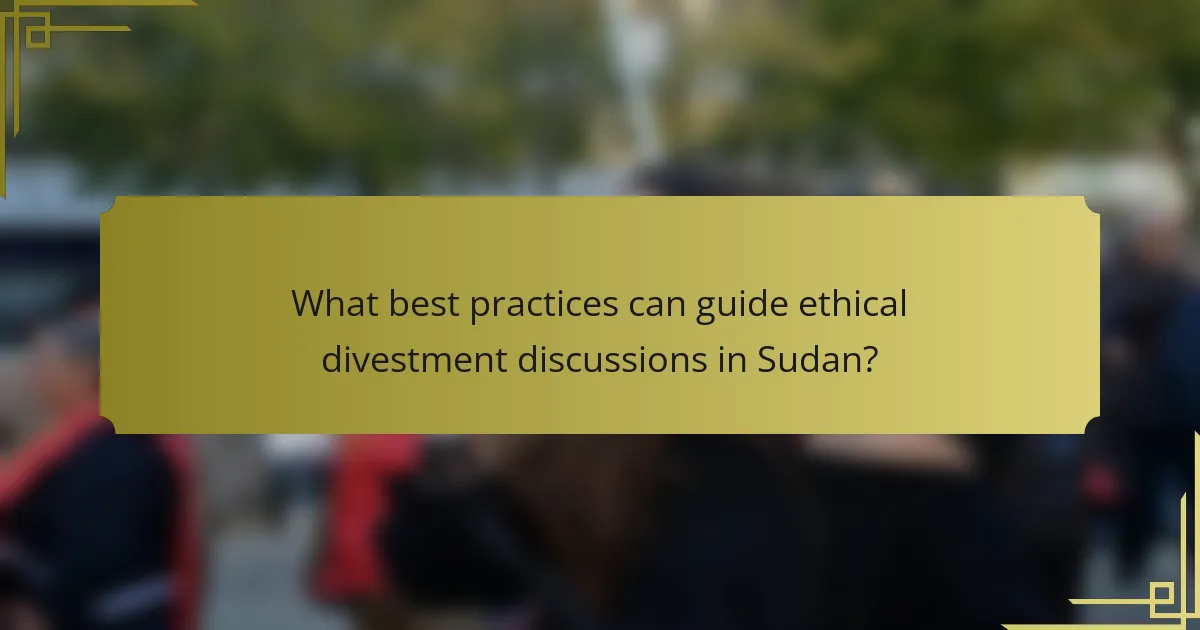
What best practices can guide ethical divestment discussions in Sudan?
Best practices for ethical divestment discussions in Sudan include stakeholder engagement, transparency, and adherence to international guidelines. Engaging local communities and affected stakeholders fosters understanding and builds trust. Transparency in the decision-making process ensures accountability and promotes informed discussions. Following international frameworks, such as the UN Guiding Principles on Business and Human Rights, provides a solid ethical foundation. Regularly assessing the social and environmental impact of divestment decisions is crucial. Documenting the rationale behind divestment actions enhances credibility. Collaborating with NGOs and human rights organizations can provide valuable insights and guidance. These practices contribute to a more ethical approach to divestment in Sudan.
What frameworks exist for ethical decision-making in divestment?
Several frameworks exist for ethical decision-making in divestment. The principle of stakeholder theory emphasizes the importance of considering the interests of all affected parties. This framework advocates for balancing financial returns with social and environmental responsibilities. Utilitarianism focuses on the greatest good for the greatest number. This approach evaluates the consequences of divestment actions on overall societal welfare.
The rights-based framework highlights the protection of individual rights and liberties. It examines how divestment impacts human rights, particularly in conflict zones like Sudan. The virtue ethics framework emphasizes the importance of moral character and integrity in decision-making. This approach encourages decision-makers to act in ways that reflect their values and ethical principles.
Research by the International Finance Corporation outlines the importance of integrating social and environmental considerations into investment decisions. This reinforces the need for ethical frameworks in divestment discussions.
How can stakeholders ensure transparency in their divestment processes?
Stakeholders can ensure transparency in their divestment processes by implementing clear communication strategies. They should publicly disclose their divestment criteria and timelines. Regular updates on progress and decisions should be provided to all relevant parties. Stakeholders must engage with affected communities to gather feedback. Utilizing third-party audits can enhance credibility and trust. Documenting all steps taken during the divestment process is essential for accountability. Transparency reports can be published to summarize actions and outcomes. This approach fosters trust and demonstrates commitment to ethical standards in divestment discussions.
What steps can be taken to engage local communities in the discussions?
Engaging local communities in discussions requires specific, actionable steps. First, organize community forums to facilitate open dialogue. These forums should be accessible and inclusive, allowing diverse voices to be heard. Next, utilize social media platforms to reach a broader audience and encourage participation. Creating informational materials in local languages can enhance understanding and engagement. Collaborating with local leaders can also foster trust and encourage community involvement. Additionally, providing platforms for feedback ensures that community concerns are addressed. Finally, continuous follow-up and updates on discussion outcomes maintain community interest and involvement. These steps have proven effective in various community engagement initiatives.
How can organizations effectively communicate their divestment decisions?
Organizations can effectively communicate their divestment decisions by being transparent and clear. They should outline the reasons for divestment, focusing on ethical considerations and stakeholder impact. Providing a detailed rationale helps build trust. Engaging with stakeholders through discussions and forums can facilitate understanding. Regular updates through press releases and social media keep the public informed. Additionally, organizations should address potential concerns and questions proactively. Clear messaging can mitigate confusion and reinforce commitment to ethical standards. Research indicates that transparency in corporate communications leads to increased stakeholder trust and loyalty.
What messaging strategies resonate with stakeholders regarding ethical divestment?
Messaging strategies that resonate with stakeholders regarding ethical divestment include transparency, emotional appeal, and data-driven arguments. Transparency builds trust by openly sharing the reasons for divestment. Emotional appeal connects stakeholders to the human impact of ethical issues. Data-driven arguments provide concrete evidence of the financial and social benefits of divestment. Research shows that stakeholders respond positively to narratives that highlight both ethical and financial rationales. For example, a report by the Global Impact Investing Network indicates that 70% of investors consider social impact when making investment decisions. This data supports the effectiveness of combining ethical considerations with financial reasoning in messaging strategies.
How can organizations demonstrate accountability in their divestment actions?
Organizations can demonstrate accountability in their divestment actions by clearly communicating their reasons for divestment. Transparency in decision-making processes is essential. They should provide detailed reports on the financial and ethical impacts of their divestment. Engaging stakeholders in discussions about divestment strategies enhances accountability. Regularly updating stakeholders on progress and outcomes is also crucial. Furthermore, organizations can establish independent audits to review divestment practices. This ensures compliance with ethical standards. By publicly sharing audit results, organizations reinforce their commitment to accountability.
The main entity of this article is the ethical considerations surrounding divestment discussions related to Sudan. The article outlines the complexities of divestment, emphasizing human rights violations, economic impacts, and corporate responsibility. It discusses the roles of key stakeholders, including NGOs and government entities, in shaping divestment strategies and highlights the historical context influencing ethical implications. Additionally, the article examines the intersection of economic factors with ethical considerations, critiques of divestment as a strategy, and best practices for ensuring transparency and community engagement in the divestment process.
